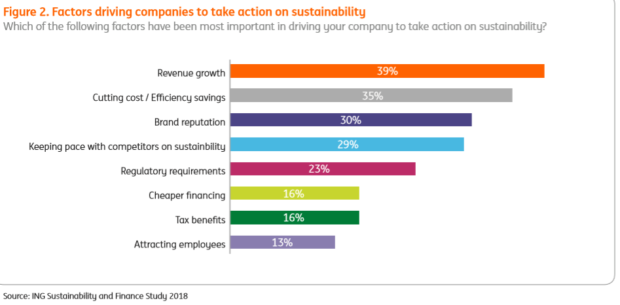ING’s research report, ‘From Sustainability to Business Value – Finance as a Catalyst’, finds that revenue growth is the most important factor when deciding to implement sustainability strategies, as 39 percent of respondents ranked this first. Cutting costs (35 percent) and brand reputation (30 percent), followed. ING commissioned this research to better understand how financing and other lending products can support its goal to help build a low carbon, sustainable society.
The “most mature” firms in the research – those with an enterprise-wide sustainability framework in place – reported better borrowing and revenue outcomes than peers. The report surveyed 210 finance executives from U.S. based companies across all major sectors with revenues from $500m to over $20 billion on the impact of sustainability strategies including improving energy efficiency, rethinking supply chains and transforming business models.
“We are witnessing an important shift in how companies in the United States view sustainability. Our research shows that it is no longer just about cutting costs or creating positive brand awareness – sustainability strategies are being deployed as true revenue drivers,” said Gerald Walker, CEO, ING Americas. “The finance function holds the key to unlocking the business value of these strategies, and are crucial to pushing the sustainable agenda in the U.S. as the industry continues to mature.”
For organizations to translate sustainability initiatives – such as circular economy operating models – into business value, the support from finance and treasury leaders is critical. Almost all respondents say their finance departments are playing a role in sustainability, with 53 percent saying that the department is the lead partner within the firm.
Notable results from the survey include:
- Nearly half (48 percent) of firms say that sustainability concerns now have some level of influence on their business’s growth strategy
- Among firms with an enterprise-wide sustainability framework (mature) in place, 43 percent say revenue growth is a main driver for acting, versus just 34 percent of other firms.
- Eighty-seven percent of the most mature firms have experienced better revenue and 65 percent have improved their credit rating, compared with 67 percent and 51 percent of less mature firms.
- Over half (52 percent) highlighted difficulty in identifying sustainability-led business opportunities as the biggest barrier to greater investment in sustainability initiatives.
- Appetite for green bonds issuance has been greatest among firms with >$10bn revenue, 48 percent having done so in the last two years.
- However, appetite among smaller firms is growing with 37 percent planning to issue green bonds in the coming two years, compared to 36 percent of larger firms planning to issue green bonds over the next two years.
“The increasing demand for green financing marks an inflection point. Our survey found larger firms have attracted a new breed of investors focused on meeting socially responsible investment mandates,” said Leonie Schreve, Global Head of Sustainable Finance at ING. “We expect this trend to now expand to organizations of all sizes, as respondents across the board reported an increased appetite to both issue green bonds and undertake green loans.”
Methodology
- Longitude, a London-based research and advisory firm, interviewed 210 U.S.-based finance executives from sectors including financial services (20 percent), manufacturing (19 percent), technology (17 percent), consumer goods (9 percent), healthcare (9 percent), with the rest coming from energy and natural resources, real estate, industrial engineering, telecommunication, media, agriculture, infrastructure, chemical, and transport and logistics.
- 30 percent of the companies have revenues of $500m–$1bn, 32 percent have revenues of $1bn–$5bn, 22% have revenues of $5bn–$10bn, 9% have revenues of $10bn–$20bn, and 7 percent have revenues of $20bn or more.
CFOs comprised 29 percent of those questioned, financial controllers 26 percent, finance directors 35 percent, and senior treasury professionals 10 percent.
ING believes financial institutions have a duty to explore how their financing can help support energy transition and combat climate change. Ralph Hamers, CEO of ING, has taken on the role of ‘climate finance champion’ in the Alliance of CEO Climate Leaders, an informal network of CEOs established and strengthened with the help of the World Economic Forum ahead of the Paris Agreement in 2015 and announced in a session in Davos this year.
Download the report here (pdf).



